They were waiting for Ukraine's return: the story of the murder of two teenagers in Russian-occupied Berdiansk and the trumped-up case against them
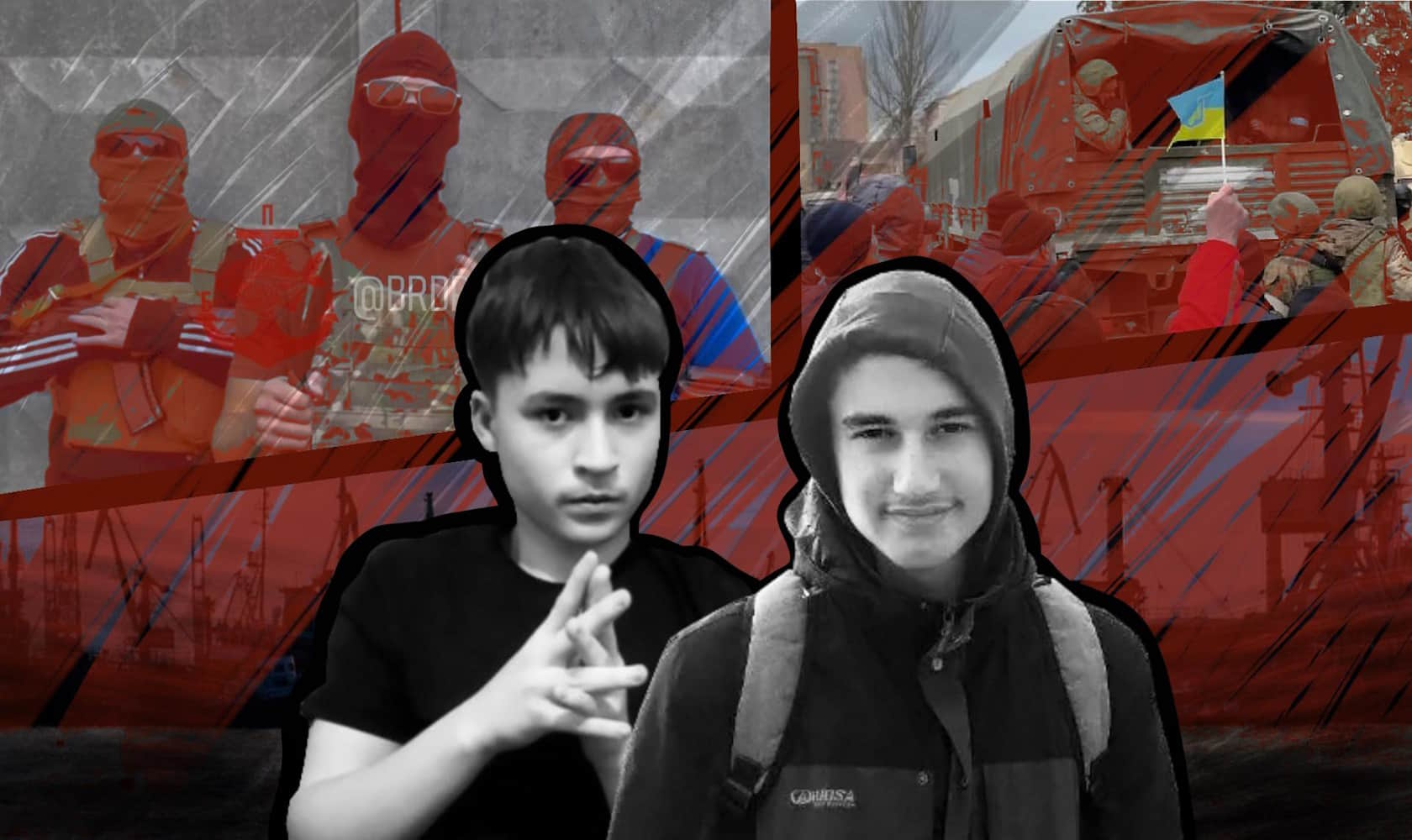
Last week, two sixteen-year-old Ukrainians, Tigran Ohannisian and Mykyta Khanhanov, were shot dead by Russian occupiers in the southern city of Berdiansk on the Sea of Azov. The occupiers claimed that the boys were the first to open fire in a local park.
In the last video he shared, one of the teenagers confirmed the "elimination of two occupiers".
Having stayed behind in the captured city of Berdiansk, the teenagers continued to resist the Russians and did not hide their pro-Ukrainian stance.
On entering the Berdiansk commandant's office, Tigran said, "Glory to Ukraine!" Those were also his last words before he was killed.
Both boys were detained by Russian law enforcement officers last autumn. From that point on, the case of their alleged "railway sabotage" started being fabricated. Lawyers provided by the occupiers themselves attempted to persuade the teenagers to cooperate with the Russians and admit to the acts they had been charged with. The teenagers gave video confessions to the Russian secret services under duress.
The Russian Federal Security Service (FSB) detained 16-year-old Tigran several times. They threatened and tortured him and brought him to a show "execution". But despite all the horror he experienced, he did not give up his pro-Ukrainian views.
"He was waiting for the Ukrainian Armed Forces, waiting for Ukraine to return," the deceased’s family recalls. "He used to tear down Russian flags and trample on them."
Locals from occupied Berdiansk add: "The Russians were afraid of them [the two boys]."
A week before the tragedy, the Investigative Committee of the Russian Federation had indicted the boys, and the case was to be sent to a Russian-established court in Zaporizhzhia Oblast. "Brace yourselves," the Russian investigators hinted darkly in their last conversation with the teenagers.
"They’re going to lock me up, and we won't see each other for 15 years," Tigran told his mother. But what happened next was far worse. The teenagers who, despite their young age, inspired such fear in the "second-greatest army in the world" were shot dead.
We obtained a copy of the so-called "indictment" and analysed it. We’ve identified some of the people involved in fabricating the case, who probably handed the boys over to the Russian secret services.
We’ve also tried to reconstruct the day of the tragedy.
"Please, please help to get the boys awarded the status of Heroes of Ukraine. They really deserve it, despite their young age!" Tigran's uncle says.
The occupying authorities have yet to return the children's bodies to their families for burial, instead posting propaganda footage about the teenagers' alleged suicides.
"On the grounds of hatred towards Russia"
This is a still from a video of a "reconstruction of the events" involving Tigran and Mykyta that the Russian secret services conducted last December.
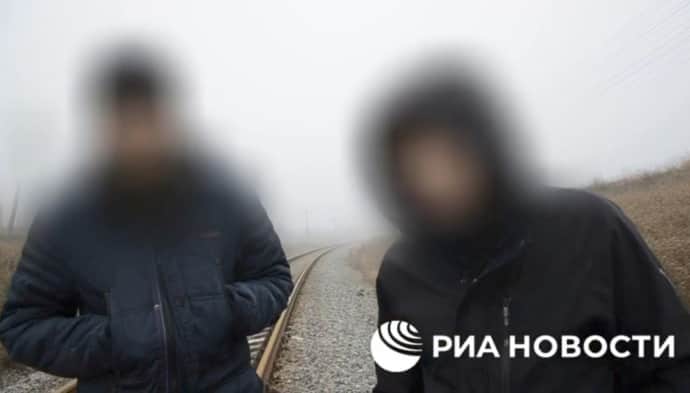
A reconstruction of the events involving the teenagers in occupied Berdiansk. December 2022
In the recording, clearly under duress, they confess to "committing sabotage" and describe how they "pushed a power pole onto a local railway track" on the Berda-Troyany railway line.
"To hinder the Russian armed forces," one of the boys says in the video.
In the same recording, an engineer from the Melitopol Railway explains the alleged "exceptional damage" caused by the teenagers.
"A transmission line was partially destroyed, which led to all means of communication being damaged. This electricity pole was then placed on the rails, which could have led to a train derailment, an accident and loss of life. Thanks to the driver's vigilance, this was avoided," he says in the video.
Furthermore, the case file states that the boys’ actions caused the Melitopol Railway company 27,200 roubles (approx. US$300) worth of damage.
The description of the crime in the case file we obtained reads as follows:
"As ardent opponents of the foreign and domestic policy of the Russian Federation, on the grounds of hatred and enmity towards the peoples of Russia, who support the current legitimate government, as well as towards military personnel and law enforcement officers, they entered into a conspiracy aimed at assisting the Armed Forces of Ukraine, nationalist battalions and other active formations."
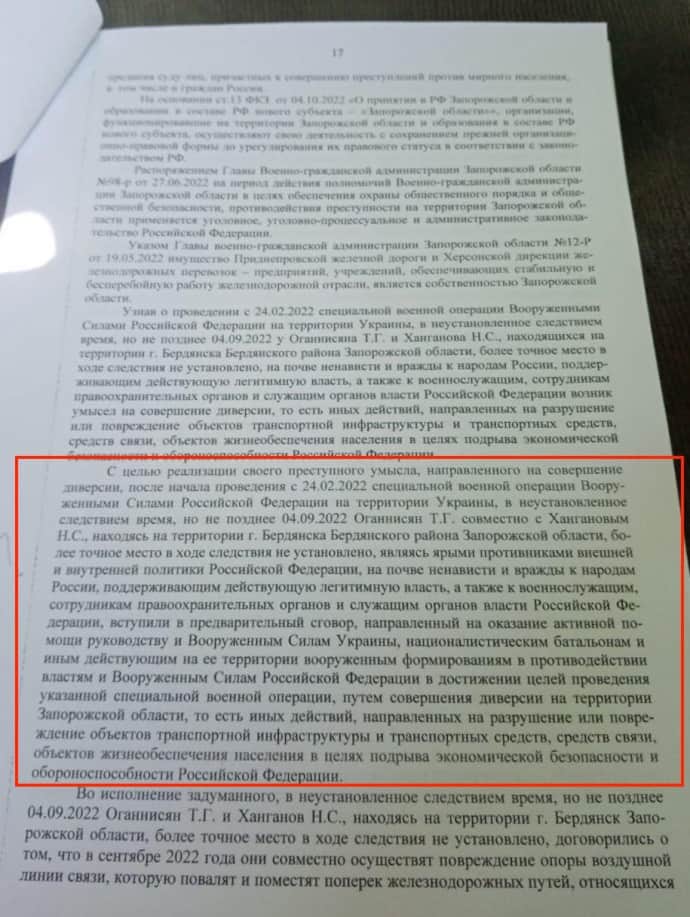
An excerpt from the 'indictment' against Tigran Ohannisian and Mykyta Khanhanov
According to the investigators, this assistance to Ukraine was provided through resisting the authorities and the Russian Armed Forces "in achieving the goals of the Special Military Operation", and the boys' actions could have led to "delays in railway transportation and would not have allowed units of the Armed Forces of the Russian Ministry of Defence to receive the assets and means necessary to carry out tasks within the framework of the Special Military Operation".
In fact, the Berda-Troyany railway line that the boys allegedly damaged had not been operating since the capture of Berdiansk, and no passenger trains were running there.
"I am 100% convinced that the case against them was trumped up, because no trains were passing through there," says Tigran's uncle, Yurii Petrenko, who has been fighting with the Armed Forces of Ukraine since 2015. "It was all blocked up there and nothing would ever be able to pass through."
The Russian occupiers noted in the case file that in the spring of 2023, investigators had searched the home of an Armed Forces of Ukraine soldier known as Petrenko, but found Tigran there instead, along with "items marked with the symbols of extremist organisations, records containing neo-Nazi propaganda, and military paraphernalia of the Armed Forces of Ukraine". The occupiers claim that Tigran supposedly went by the alias "Kot" and Mykyta was known as "Siebert". The file also indicates that the boys were reservists.
Tigran's mother Oksana is also convinced that the case was trumped up.
"It says that a train was coming, there was a driver... But everyone understands perfectly well that the city is occupied, and no trains have been running since 24 February 2022. The railway is rusted up," Oksana says.
"They made it all up, they found this invisible train, a driver, people on the train... It's nonsense. In December, the boys were told to confess on camera and then they would be released," Oksana recalls. "They did so, and we came [to collect Tigran] in January, but when we tried to take him away, they turned us away and said: ‘He’s not allowed to leave because he’s been charged with sabotage, and we have a video of him confessing.’"
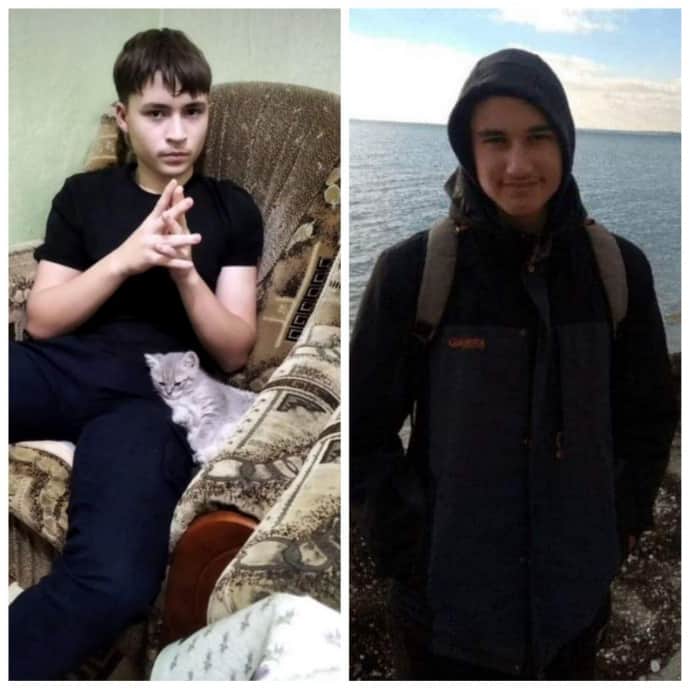
Tigran Ohannisian (left) and Mykyta Khanhanov (right)
In the case file, Mykyta did not admit his guilt, and he stated in his testimony that they had knocked down the pole to steal precious metal, as well as "to show off". According to locals, Mykyta was not held captive or tortured.
The greatest pressure was exerted on Tigran, who, according to the occupiers' indictment, "pleaded guilty on all counts".
Who fabricated the case?
The FSB led the case initially. They first took Tigran in for questioning as long ago as last September and looked around for "witnesses".
"About 40 people came forward: Kadyrovites, regular soldiers and plain-clothes FSB," Tigran's neighbour recalls. [Kadyrovites are Chechen forces led by Chechen leader Ramzan Kadyrov who fight alongside the Russian army - ed.]
"He wasn’t held for long that time - about five days - and then he was released," says Olha, a Berdiansk local who was in the city at the time. "He became very withdrawn after that, he didn't talk to anyone, didn't say anything. He had trouble sleeping. His grandmother became very anxious. It wasn’t until later that he revealed he’d been taken to an 'execution' with a bag over his head, beaten, and tortured by electrocution."
The case was then transferred to the Investigative Committee of the Russian Federation.
Two Russian investigators, I. Khusainov and V. Govorukha, as well as Dmitry Zagoruiko, the Russian-installed so-called 'first deputy prosecutor' of Zaporizhzhia Oblast, signed off on this.
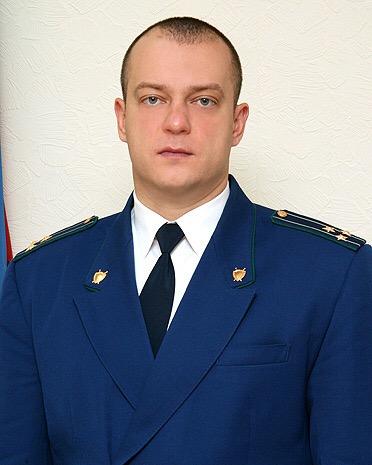
Dmitry Zagoruiko, so-called 'first deputy prosecutor' of Zaporizhzhia Oblast.
Dmitry Zagoruiko was appointed to his post by Russian Prosecutor General Igor Krasnov personally. Zagoruiko had previously worked at the Prosecutor's Office in Rostov-on-Don, Russia, and then served as Deputy Prosecutor of the Republic of North Ossetia (a constituent entity of the Russian Federation).
V.Govorukha is likely one of the Moscow investigators who dealt with juvenile cases. In 2017, he gave an interview about the specifics of handling criminal offences committed by adolescents.
Another investigator involved in the case, who specifically refused to give the victims’ families permission to bury the bodies, is known only by his last name, Kogun.
Mykyta Khanhanov's father was named as his legal representative in his documents. But Tigran Ohannisian’s legal representative was a "guardian" assigned to him by the occupiers themselves - Svitlana Peicheva, a local collaborator and former director of the Berdiansk District Centre for Social Services. The previous autumn, she had applied to a "Leaders of the Revival" recruitment drive organised by the occupying authorities of Zaporizhzhia Oblast to fill positions in the new "administration".
In an interview given to local propagandists, Peicheva said that she planned to use her 14 years of social services experience in the occupied city. "I understand that there is a need for social work to be carried out specifically by civil servants, because a new policy, including social policy, is being developed in our territory," the collaborator said.
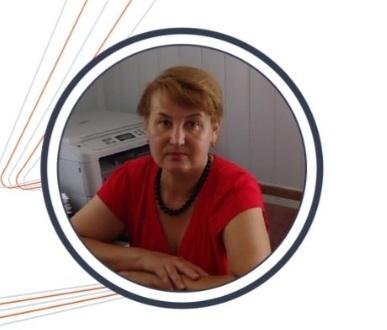
Collaborator Svitlana Peicheva, who was appointed as Tigran Ohannisian’s guardian by the Russians
The defence lawyers - Oleksandr Panchenko from Berdiansk and Valerii Bohdan from the occupied town of Polohy - were also assigned by the Russians. Rather than providing defence, they were persuading the minors to cooperate with the Russian Federation. We managed to get through to Bohdan on the phone, but he refused to talk to us.
Vira Siritsa, a psychologist from local school No. 10, was also involved in the case. Before the city was captured by the Russians, she had been working as a psychologist at Berdiansk Gymnasium No. 2.
In addition, the case also involved a so-called "victim’s representative" - Oleksandr Andriushchenko from the occupied village of Novobohdanivka in Melitopol district.
The case had no witnesses for the defence and about 20 witnesses for the prosecution, mostly employees of Melitopol Railway, law enforcement officers and collaborators.
Berdiansk resident Oleh Drianiev, an Afghan war veteran, was one of the witnesses for the prosecution. He had been Tigran and Mykyta's teacher at 'Young Friend of the Border Guards', a military-patriotic club, and after the occupation, he sided with the Russian Federation.
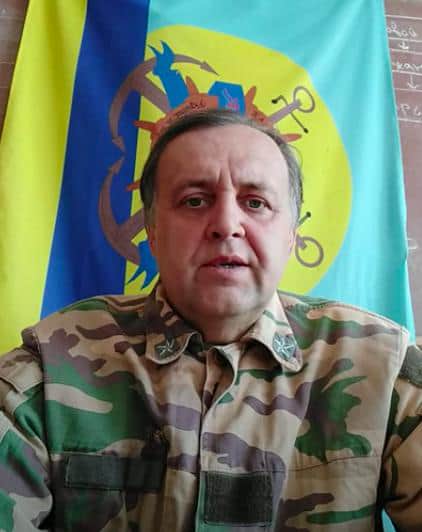
Oleh Drianiev, a collaborator and former teacher of the murdered teenagers.
According to locals, it was Drianiev who handed the boys over to the FSB.
"He realised that they were a danger to the Russians," local resident Olha says.
Prior to the full-scale invasion, Drianiev had run his own website, where he posted videos of his students' military training lessons. He continues to run his club under the guidance of the occupying authorities of the region.
Drianiev's wife Svitlana, also a collaborator, heads Zoryanyi, an extracurricular education centre in Berdiansk. According to archival news from Berdiansk, Mykyta Khanhanov attended this centre too. Zoryanyi's outreach activities were partly funded by Oleksandr Ponomaryov, an MP from the Opposition Platform for Life faction [a now-banned political party with links to Russia - ed.] who holds a Russian passport. At the start of the full-scale invasion, the MP’s office buildings and the Azmol plant associated with him were occupied by the Russians and he was allegedly detained by the Russian secret services, but later released.
"When the Special Military Operation started, 25 people stopped attending the club, including Tigran Ohannisian and Mykyta Khanhanov," Drianiev's testimony reads, and he goes on to describe the boys as "unstable, easily influenced teenagers who have no opinions of their own".
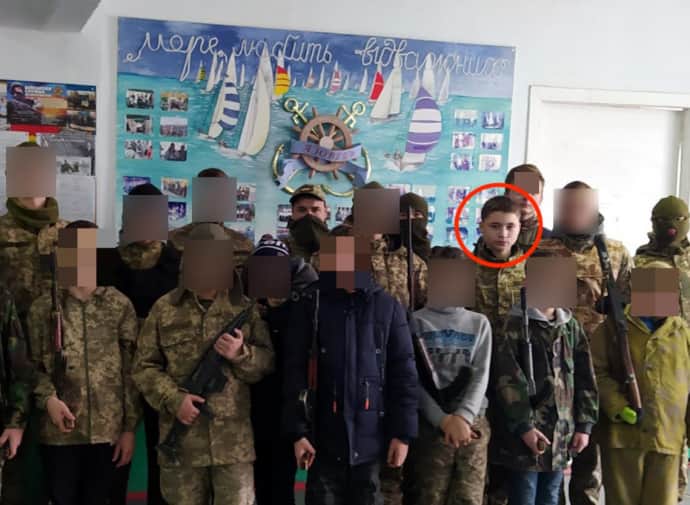
Tigran Ohannisian at the ‘Young Friend of the Border Guards’ club.
Tigran’s family told us that he had trusted Oleh and thought he was pro-Ukrainian until the last moment. But when he found out about the teacher’s betrayal, he cut off all contact with him.
Teenage patriotism
Tigran Ohannisian and Mykyta Khanhanov were 16 years old.
They were born in Berdiansk. The boys were close friends, classmates and neighbours; they attended the military-patriotic club together. Tigran chose to stay in Berdiansk after it was occupied by the Russians, despite having the opportunity to leave.
"We were in tears begging him, but he said he wouldn’t leave," Tigran's mother Oksana recalls. "He was waiting for liberation, waiting for Ukraine’s return."
"We were out together one day," a friend of Tigran's recalls, "and I was saying ‘Bastards!’ about the occupiers under my breath, and he said to me: ‘Why don't you say that to their faces?’"
Tigran himself was not afraid to state his pro-Ukrainian position openly.
"When he was summoned to this commandant's office, he went in and said: ‘Glory to Ukraine!’" says the boy's uncle, Yurii Petrenko. "We warned him not to do that, because he was facing the enemy... But he stuck to his guns. I will avenge him..."
His uncle was like a father to Tigran. They were very close, and Tigran always looked up to him.
"I used to teach him all sorts. I taught him to shoot an air rifle, he tried on my uniform, he wanted to join the fighting. He was very interested in the history of Ukraine. When the war broke out, he said he wouldn’t leave his country, his grandmother, or his city. He tore down Russian flags in Berdiansk and trampled on them, shouting ‘Glory to Ukraine!’... He has done well, and he will always be a hero for me, a hero who accomplished a lot at 16," his uncle reflects.
The last day of their lives
Russian law enforcement officers came to Tigran's home on the evening of 23 June, but the boys managed to hide that time.
The following day, Russian occupiers returned and spoke with the boys. The nature of their conversation is not known. It probably concerned the transfer of the case to court.
"The only thing he told me was that the investigator asked him to sign some documents, and he refused," Oksana, Tigran's mother, recalls briefly. "The investigator was in a hurry and left."
According to Tigran’s family, he had realised that he would not be able to get help and was trying to get out of the occupied territory.
"He didn’t intend to run away or hide. He came regularly to check in. But lately, he just really wanted to leave because it was no life for him there. He said: ‘I won’t survive another detention’," Oksana recalls.
According to Oksana, her son had been traumatised by his previous detentions and torture.
"He is very strong and never showed his fear. But when he told me he couldn't survive another detention... I can't even imagine what they did to him there," Oksana says.
Tigran’s mother spoke to him on the eve of his murder, and he said he would be home by 9 pm. He also spoke to his younger sister, and he was in good spirits.
The last person to see the boys was Tigran's grandmother, Raisa. She said that they did not seem down and "there were no signs that anything bad was about to happen".
"Mykyta's birthday was coming up. They said they would go for a walk and check out potential celebration venues," Tigran's grandmother recalls. "I also asked them to pick some cherries for me and said I would pay them for it."
At 19:17, the first reports of a shooting in the city began to appear in local social media accounts in occupied Berdiansk.
At 19:20, some locals reported: "Everyone’s running away, one cop’s head is covered in blood."
At 19:34, locals reported that they had seen an ambulance leaving and said that everything seemed to have quietened down. "They say someone has been killed near Santa Maria [a shop - ed.]," one local wrote.
At 19:54, shooting resumed around the harbour. "They are looking for someone," locals reported.
At 20:00, a message appeared: "That’s it. Now eliminated."
Russian propagandists posted a message at 20:55 about the "elimination of two pro-Ukrainian militants", including Tigran Ohannisian.
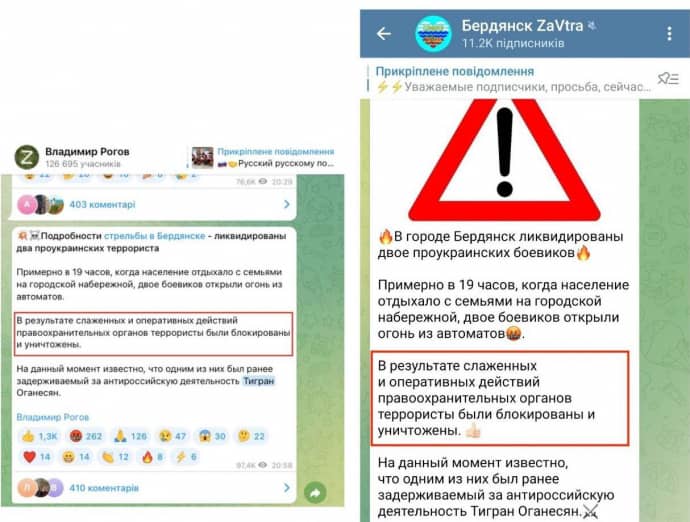
"They most likely killed a guard near the Administrative Services Centre and took his weapon," witnesses tell us, trying to reconstruct the teenagers' route. "They were walking down Zemska Street towards Schmidt Park. The café where they started shooting the orcs [a derogatory name Ukrainians give to Russian occupiers - ed.] is located at the T-junction of Zemska Street and Pratsi Avenue in Schmidt Park. Then they ran to the Repair Centre."
It was probably there that Tigran's last video was recorded. It is not known to whom he sent his last messages.
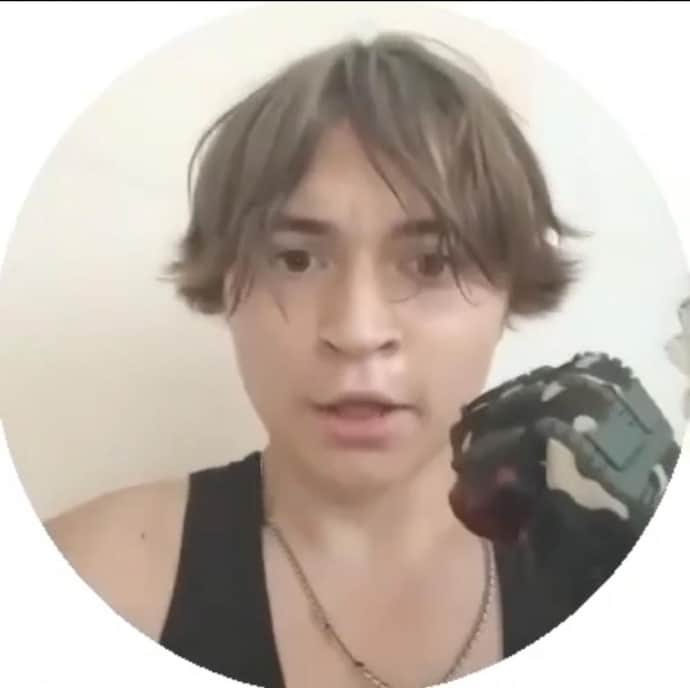
A still from Tigran Ohannisian’s last video
According to eyewitnesses, the boys’ whereabouts was made known to the occupiers by local taxi drivers.
"The guys who killed them were ethnic Russians," eyewitnesses told us. "Not Dagestanis, not Kadyrovites, but Russians."
On the evening of 29 June, a message appeared on a pro-Ukrainian social media account in Berdiansk revealing who was allegedly responsible for the teenagers’ deaths.
"I wish to inform you who killed Tigran Ohannisian. It was done by the occupying police of Berdiansk, namely Yaroslav Shevchenko and Dmitry Balan," the message reads. "These people are involved in torturing locals, many people have identified them. They hate Ukraine, they beat people up for expressing any patriotic views. It was them who opened fire and shot Tigran Ohannisian."
We have identified these men on Russian social media. They are indeed residents of Berdiansk.
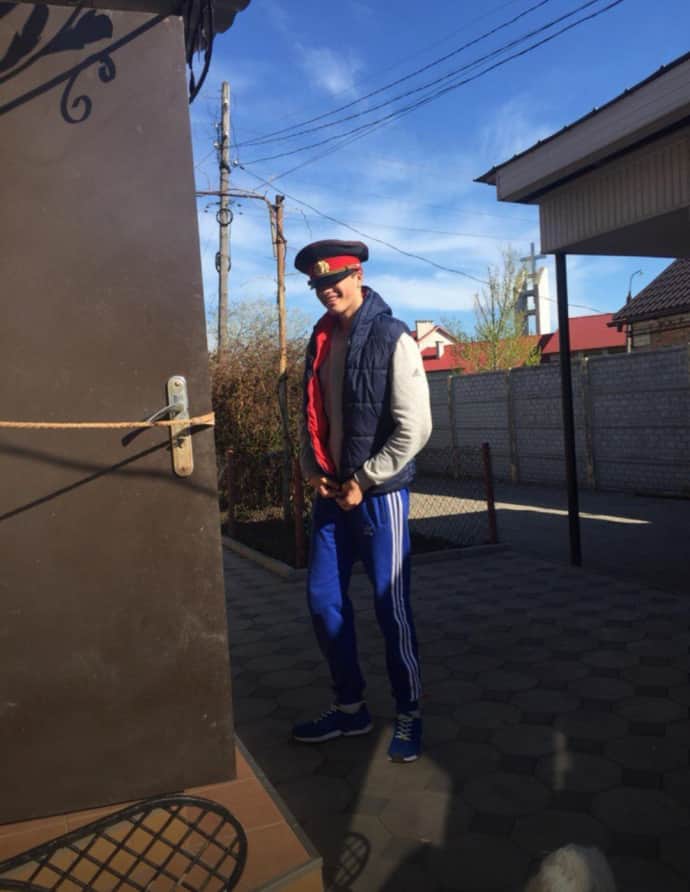
Yaroslav Shevchenko.
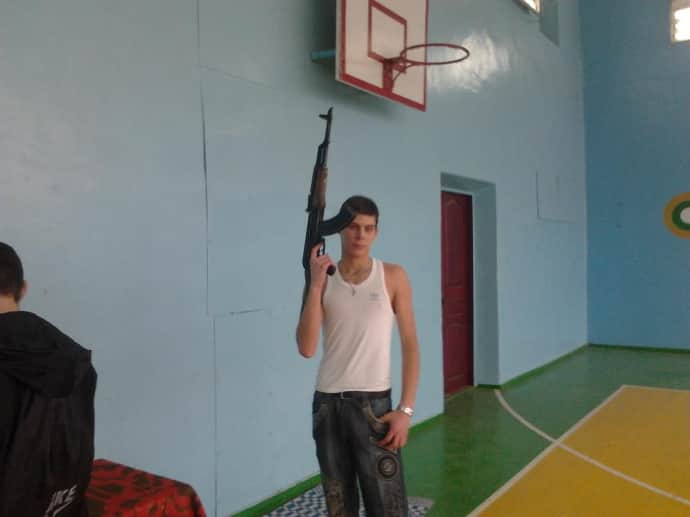
Dmytro Balan.
We managed to call Dmytro Balan. He confirmed his identity, but when we asked him about the teenagers’ murder, he became nervous, said "I don't know anything about that" and hung up. We were unable to contact Yaroslav Shevchenko.
On 2 July, the Russians themselves posted a story in which they described how Tigran and Mykyta had allegedly killed a police officer following orders from the Ukrainian special services and then shot themselves.
At the same time, the Media Initiative for Human Rights, a Ukrainian human rights organisation, stated that Tigran and Mykyta were shot dead by snipers.
The Berdiansk Partisan Army, an underground organisation, stated that the teenagers’ murder was organised by representatives of the FSB.
"When we put emotions aside, a completely different picture emerges: what happened yesterday was a fully planned operation by the FSB," the underground organisation said.
"It’s simple. The Russian monsters gave the guys a choice: either die in a basement or take up arms and join the war. Knowing full well what would happen," the organisation said.
Lawlessness in occupied Berdiansk
The occupying authorities did not allow the families of the murdered teenagers to view the bodies. Later, only Mykyta's father was allowed to enter the morgue.
"Tigran has a hole from an assault rifle between his eyes and through his heart. Mykyta’s lower jaw is missing, his stomach is ripped open. Both Tigran and Mykyta are missing the backs of their skulls," the family says.
Berdiansk locals say that after the boys’ murder, their families’ homes were bugged and repeatedly searched.
"They came, allegedly looking for Tigran's phone, and turned everything upside down," says one local resident, adding that Russian occupiers also tapped her neighbours' mobile phones. The locals say that the Russians treated Tigran's grandmother appallingly.
"They swore at her, pushed her, and hit her in the shoulder with a rifle butt... And they are about 28 years old," a local resident tells us.
When the grandmother went to the local priest from the Moscow Patriarchate, he refused to see her.
"In fact, he started saying that the boys had shot themselves," said a friend of the Ohannisian family.
"You just don't understand what kind of city we live in," said another Berdiansk local. "We have no rights, and no one to complain to..."
"The boys were under terrible pressure," says Andrii Yakovliev, the lawyer for Tigran's family. "The investigation itself was conducted in such a way that the boys could not count on justice. They could see that a situation was unfolding that they would not be able to withstand. There are no independent courts and investigations in the occupied territories. They are an extension of the executive policy of the occupying authorities. The guys were cornered, and I wouldn’t rule it out that they might have done something like this because they just broke down. And the investigators did not resolve this situation properly. They acted as if the boys were adults..."
"You have to understand that they were 16 years old. They were detained three times, and we don't know how this affected them mentally," says Ihor, a Berdiansk local. "Who they communicated with outside the city of Berdiansk is also important. It could have been some radical right-wing organisations. Yes, there are a lot of young people in such groups, but it never goes any further than some shouting and fighting. The circumstances of their murder are very complex, and we’ll probably never untangle them now."
The Russian occupiers have yet to return the teenagers’ bodies to their families for burial.
"The families were told they had sent them to Melitopol for some kind of research," locals tell us, "But at the same time, the morgue in Berdiansk has been under heavy security for several days."
The investigation
The Security Service of Ukraine in Zaporizhzhia Oblast informed us that criminal proceedings have been opened under Article 438 of the Criminal Code of Ukraine: violation of the laws and customs of war.
The investigation is ongoing, and all the circumstances of the crime are being established as far as possible.
Dmytro Lubinets, the Ukrainian Parliament’s Human Rights Commissioner (Ombudsman), believes that there is every reason to call the murder an extrajudicial killing and adds that he has appealed to the Russian side to return the bodies of the minors to Ukraine. He has also appealed to the international community to record this crime by the Russian Federation.
In early June, after the Russian criminal case against the teenagers became public, the European Parliament adopted a resolution calling on Russia to end the prosecution.
The Ombudsman's Office told us that they have been negotiating with the Russians to have the teenagers’ bodies returned to Ukraine.
"However, the Russian side has not resolved this issue," the Ombudsman's Office said. "Unfortunately, we are not responsible for what is happening in the temporarily occupied territories. The Russian side bears full responsibility for ensuring human rights in the temporarily occupied territories. And sad as this may sound, in the territories temporarily controlled by the Russian Federation, many children are not buried at all."
.....
The deaths of Tigran and Mykyta will not stop the resistance movement, but only generate further hatred for those who came with war to our land.
Those responsible for the teenagers’ murder and the fabrication of the case against them must be punished.
The deceased boys will forever go down in the history of Ukraine for reminding the occupiers that "Berdiansk is Ukraine!"
Translation: Oxana Hart
Editing: Teresa Pearce